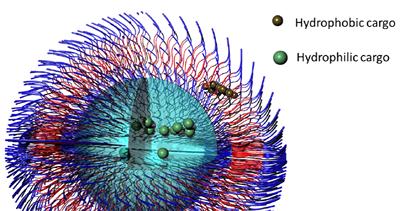Developing nanoparticles to deliver drugs to treat difficult-to-treat infections

A multidisciplinary team, in collaboration with industry, are working on developing polymersome nanoparticles as tiny capsules to deliver antibiotics to cells. Polymersomes are made of amphiphilic polymers (which have some characteristics in common with soap) that self-assemble in water and encapsulate drugs. The team have shown that these nanoparticles can get inside human cells and that they can deliver drugs more selectively and with fewer toxic effects.
With funding from Dstl and EPSRC, they are developing this technology to target difficult-to-treat infections like melioidosis (caused by Burkholderia pseudomallei). These infections are particularly challenging because the bacteria live inside human cells. The doses of antibiotics required for treatment have the risk of causing AMR, and so a more targeted approach may lead to smaller, more targeted doses being used.
If the technology is proven against Burkholderia pseudomallei and similar infections, it is possible that they may be applied to the SARS-CoV-2 virus that causes COVID-19. Like B. pseudomallei, SARS-CoV-2 also causes disease by breaking-and-entering human cells. Other groups have previously shown that viruses like influenza can be targeted by drugs that inhibit viruses. So in future the team’s polymersome technology may yet have applications in the fight against the pandemic.
The video above shows fluorophore-loaded polymersones being taken up by mammalian cells. The cells glow green as the dye-containing polymersomes open up and release their contents.
The team brings together Dr Nick Evans (Bioengineering), Dr Tracey Newman (Medicine) and Eleanor Porges (PhD Student) at the University of Southampton with Dr Caroline Rowland, Dr Dominic Jenner and Adam Taylor from Dstl.
Professor Leighton said “The team have been enthusiastic members of NAMRIP’s programme of workshops over the years, designed to enable researchers to form new multidisciplinary collaborations, and have been stalwarts of NAMRIP’s outreach and public engagement programme. I am delighted that NAMRIP provided pump-priming funds early in the team’s work with nanoparticles.”